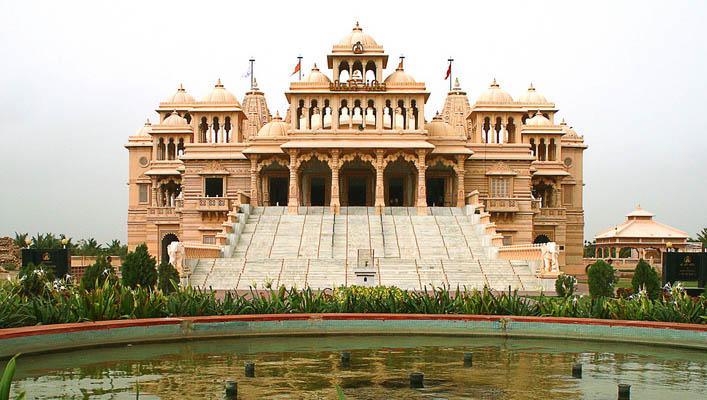
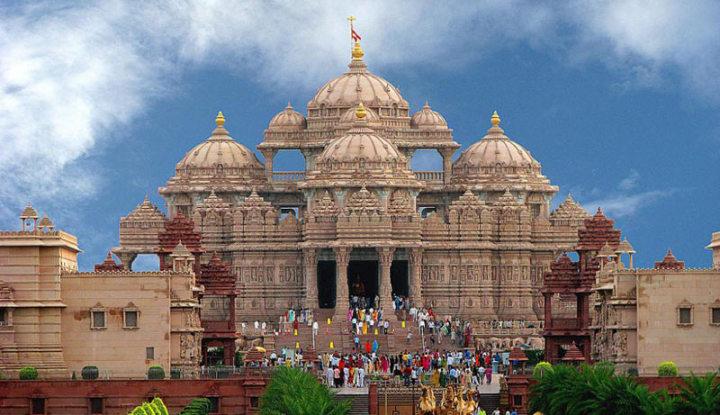
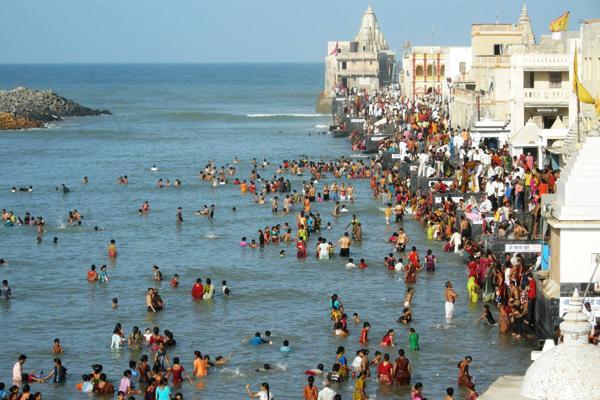
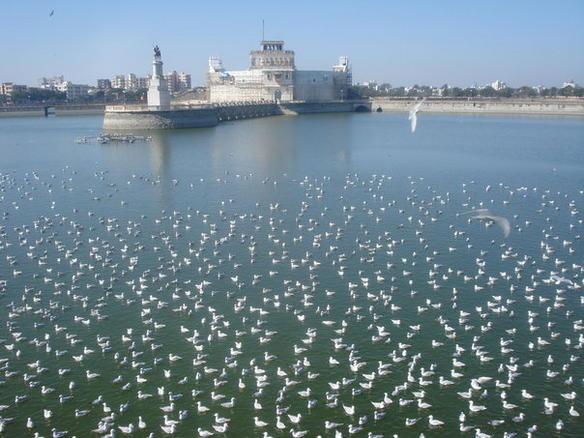
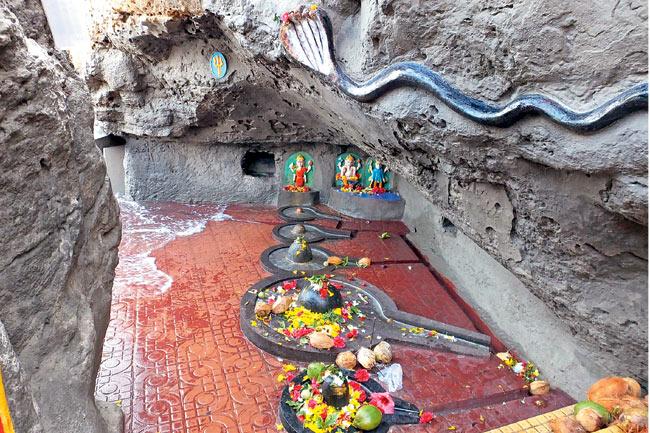
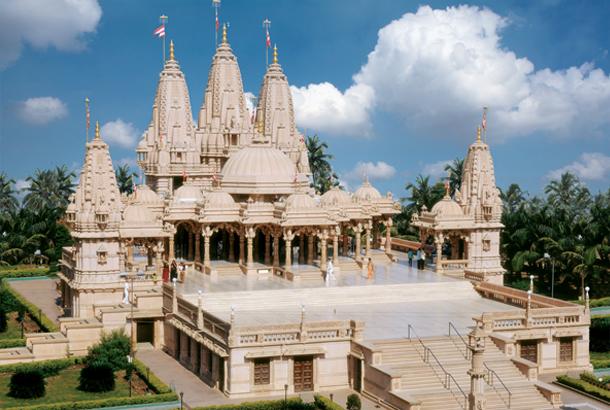
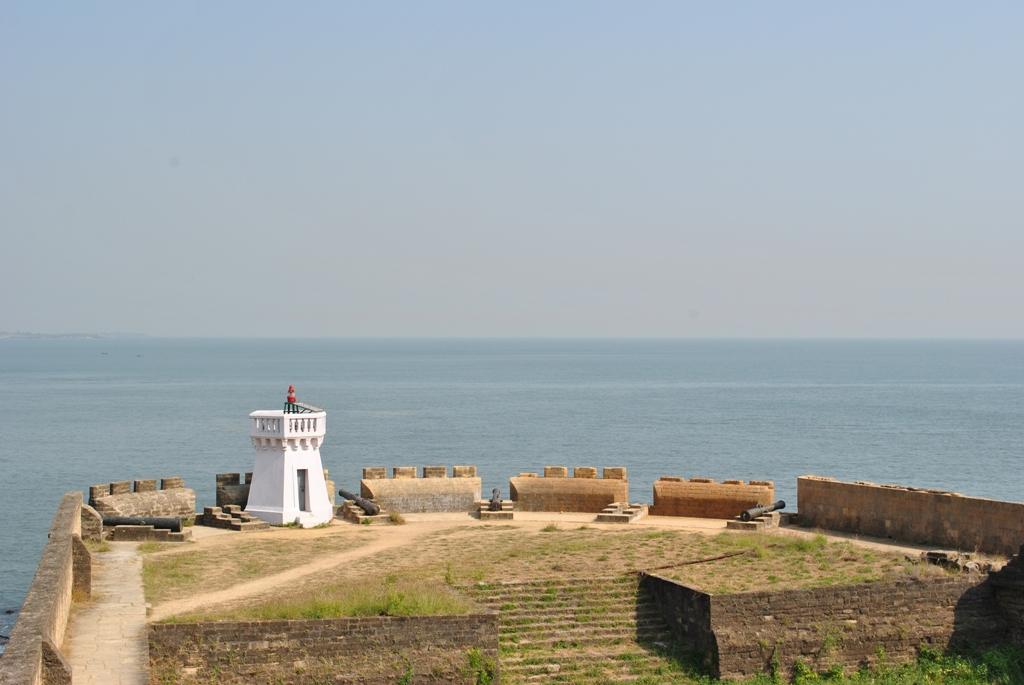
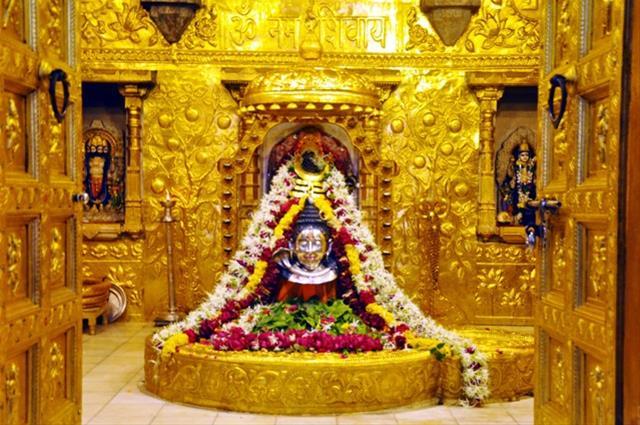
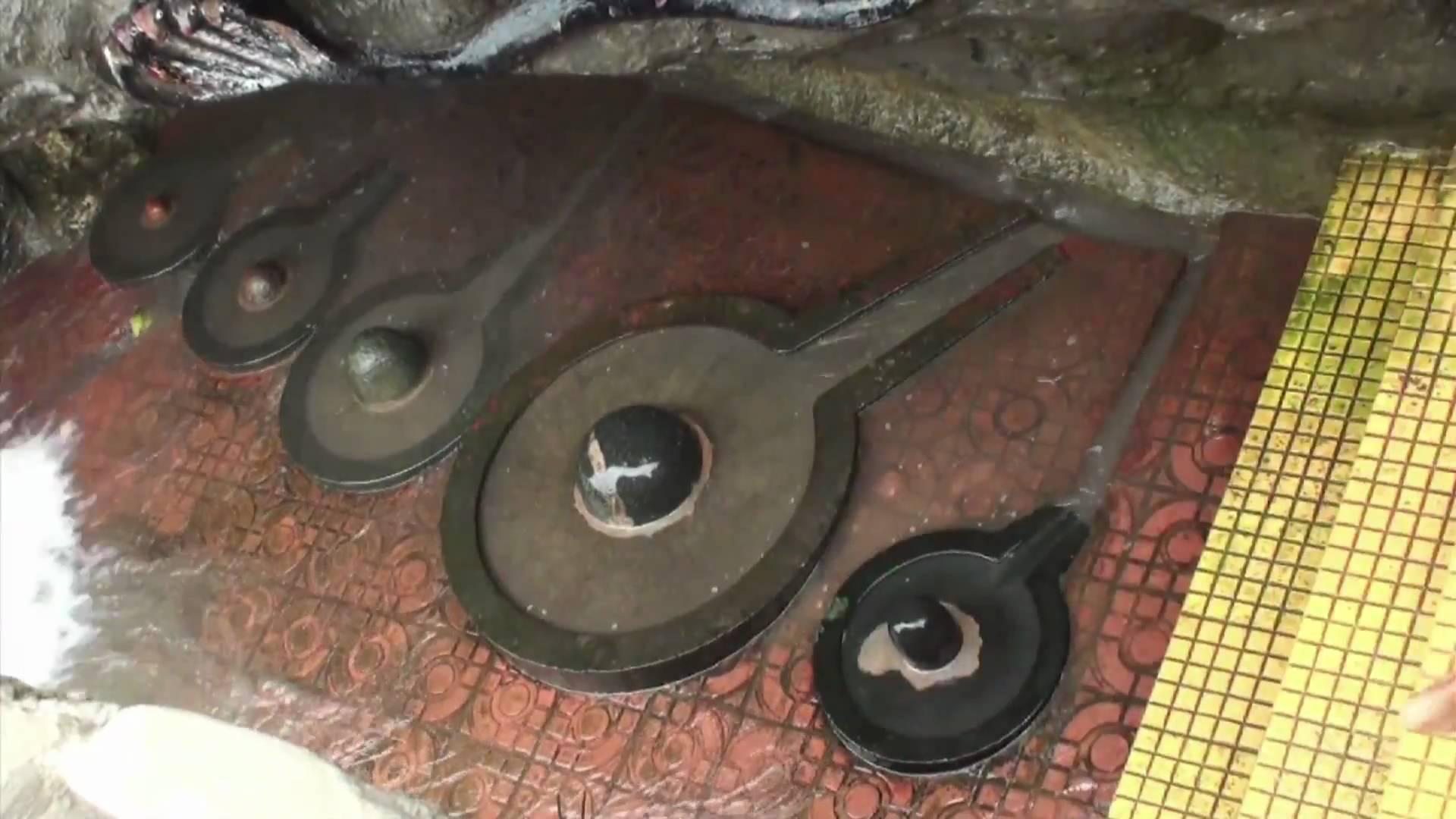
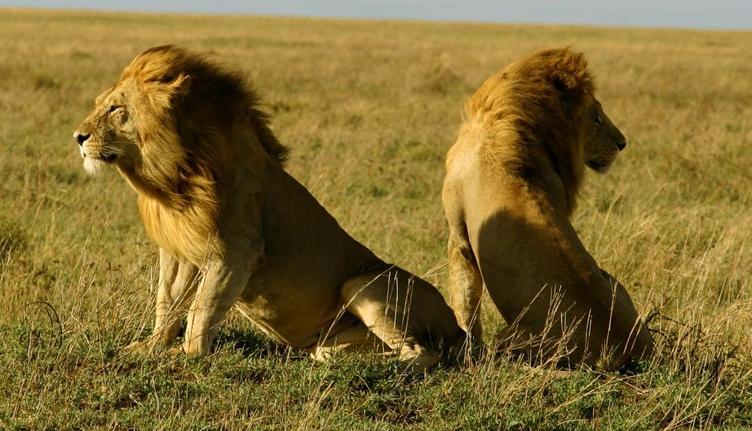
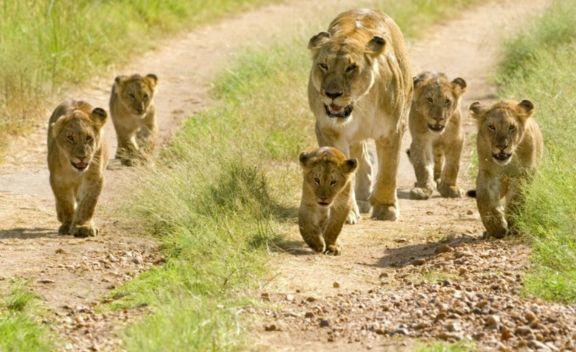
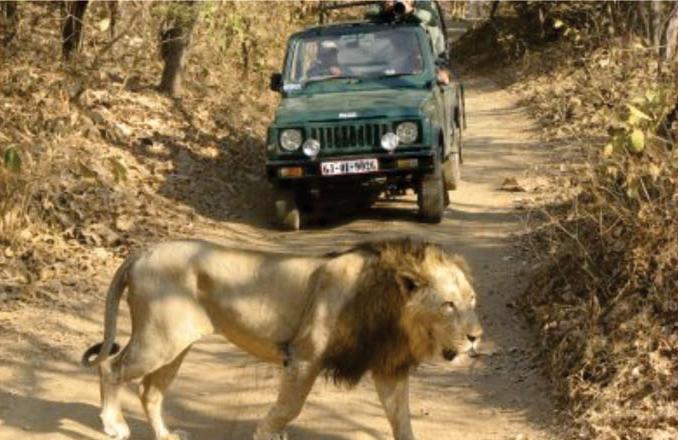
Roughly 300 kilometers from Ahmedabad, Jamnagar is another little-touristic but interesting city, brimming with ornate, decaying buildings and colourful bazaars displaying the town’s famous, brilliant-coloured bandhani (tie-dye) – produced through a laborious 500-year-old process involving thousands of tiny knots in a piece of folded fabric. Perhaps best of all, people here are exceedingly friendly. Before Independence, Jamnagar was capital of the Nawanagar princely state.
Let your passion trail your root, where once stood the City of Thousand Doors – Dwarka. Dwarka literally feels like the end of the earth. Enter the city of the God, a remote pilgrimage spot at the extreme western tip of the Kathiawar peninsula. This is one of the four most holy Hindu sites in India, where Krishna Vasudeva built his capital after leaving Mathura.
The lord here blesses his devotees with wide, benevolent eyes, gazing for time immemorial, from his seat, 60 miles away from his submerged kingdom of 32,000 years old, which is twice the size of Manhattan. From the lingering existence of the folklore, scale the historicity of Lord Krishna Vasudeva, the king maker, who can reveal a lot about, what are vivid, yet unsaid truths of the Saraswat Civilization and Pre Vedic Primary Prakrit.
Behold, as the famous, phoenix-like temple of Somnath will stand gazes at you in neat gardens above the beach, 6km southeast of Veraval. The sea below gives it a wistful charm of the endless time. Somnath celebrates Kartik Purnima, marking Shiva’s killing of the demon Tripurasura, with a large colourful fair, a spectacle worth witnessing. Legend had it that the moon God Somraja first erected Somnath, a temple made of gold. This was rebuilt by Ravana in silver, by Krishna Vasideva in wood, and by Bhimdev in stone; all bedecking the Phallic Stone, the heart of the temple, one of the 12 most sacred Shiva shrines, known as jyotirlinga.
Witness the self-illuminating temple in the coastal serenity that even prompted the most unwelcoming visit of the infamous looter Mahmud of Ghazni from Afghanistan. Gazni was baffled with the wealth of the temple, which also included 300 musicians, 500 dancing girls and even 300 barbers. It took two days to take the temple town, where 70,000 Hindu defenders were slaughtered. So began a pattern of Muslim destruction and Hindu rebuilding that continued for centuries. The temple was again razed in 1297, 1394 and finally in 1706 by Aurangzeb, the notorious Mughal ruler. After that, the temple wasn’t rebuilt until 1950.
Visit Diu, an island with difference. This tiny island linked by a bridge to Gujarat’s southern coast is infused with Portuguese history; its major architectural landmarks include three churches and a seafront fort; the streets of the main town are remarkably clean and quiet once you get off the tourist-packed waterfront strip. With Daman, it is still governed from Delhi as part of the Union Territory of Daman & Diu and is not part of Gujarat. The northern side of the island of Diu, facing Gujarat, is tidal marsh and salt pans, while the southern coast alternates between limestone cliffs, rocky coves and sandy beaches.
Spend some majestic time with the majesty in Gir, whose history has a strong and long connection to the antiquity. Be in the dwelling of the Gir lions, once which stretched west, across Asia, as far as Greece. These were the lions that Anthropolis and Deniel faced, the lions of ancient Greece and Bible. These were the same lions that the Romans set up on the Christians in the coliseum. Grab your chance to visit the very last of this ancient race, still living in Gir.
Baffle your senses to discover the mystic connection between the local people and the beast around. Although, the lions are here since time immemorial, and so did the African populace, the Siddis – possibly arrived in the 18th century with an East African princes, who married the Nawab of Junagarh, the local Indian rulers. Perhaps Gir is the last place left in Asia, where the semi-nomadic community of distinctively dressed Maldhari, has been here, amidst the ancient beasts, living on easy harmony with the large predators, as all their ancestors once did. Know how these people are living here for centuries, grazing their herds beneath the nose of the large feline neighbours.
Experience the time travel of the classic civilization in the old city of Rajkot, east of the newer centre, still has plenty of character, with narrow streets, markets, and farmers still selling ghee on street corners. Rajkot was founded in 1612 by Jadeja Rajputs, and in colonial times it became the headquarters of the Western India States Agency, Britain’s administrative centre for some 400 princely states in Saurashtra, Kachchh and northern Gujarat. After Independence Rajkot was capital of the short-lived state of Saurashtra.
Day 1 : Arrival at Jamnagar and Proceed to Dwarka.
Arrive at Jamnagar and proceed to Dwarka (150 kms - 4 hours). Visit Dwarkadheesh Temple in the evening. Dwarkadhish Temple is one of the most significant and visited Lord Krishna Temples in India. Overnight at Hotel.
Day 2 : Temple visits in and around Dwarka. Proceed to Somnath.
After breakfast visit Okha for the Beyt Dwarka. Beyt Dwarka is an island accessible over a short boat ride where a prominent Lord Krishna Temple is located. Upon return visit Nageshwar Mahadev Temple enroute. Nageshwar temple is believed to be one of the 12 Jyotirlinga Temples. Visit Rukmini Devi Temple, Gomati Ghat Temples after returning to Dwarka. Travel to Somnath (240 kms - 4.5 hours). Enroute stopover at the Harsiddh Mata temple offering excellent views of the the Arabian Sea. Reach Somnath by evening. Overnight at Hotel.
Day 3 : Somnath Temple visit. Travel to Diu. Evening beach visit.
After breakfast visit Somnath Temple, a renowned Shiva Temple and considered one of the 12 Jyotirlinga Temples and one of the most visited Shiva Temples in India. Time permitting visit Bhalka Teerth. Travel to Diu (90 kms - 2 hours) .Diu, an erstwhile Portuguese Colony and now a popular beach getaway. Evening visit to the Nagoa beach. Overnight at Hotel.
Day 4 : Sightseeing and activities around Diu
After breakfast sightseeing around Diu includes Nagoa Beach, St. Pauls Church, Diu Museum, Diu Fort. Watersports include Para Sailing, water skiing, water scooter, Family boat and speedboats are on offer at Ahmadpur Mandvi beach. Overnight at Hotel.
Day 5 : Travel to Sasan Gir via Somnath. Evening Safari in Sasan Gir.
After breakfast proceed to Sasan Gir (120 kms - 3 hrs). Sasan Gir is only abode of Asiatic Lions and considered excellent for bird watching. The park checklist has 250 birds and about 50 other species (including the endangered lesser florican and the saras crane) are recorded in the grasslands along the perifery of the sanctuary. Evening Safari in Gir. Overnight at Hotel.
Day 6 : Morning and Evening Safari at Sasan Gir
Sasan Gir has number of areas / wetlands that offer excellent Bird watching opportuniteis. Undertake safaris (morning and evening) for exploring different areas of the park. Kamleshwar Dams are home to Crocodiles. Lion sighting is generally good all through the year. Overnight at Hotel.
Day 7 : Departure
After breakfast departure to Rajkot (160 kms - 3 hours) and proceed to onward journey.
Inclusions
Exclusions
|
HOTEL DETAILS |
|||
|
CATEGORY |
STANDARD |
DELUXE |
LUXURY |
|
Dwarka |
Hotel Krishna Inn or similar |
Goverdhan Greens Resort or similar |
Dwarkadhish Lords Eco Inn or similar |
|
Somnath |
Hotel Somnath Sagar or similar |
Hotel Sukh Sagar or similar |
Hotel Lords Inn or similar |
|
Diu |
The Hoka Resort or similar |
Hotel Apaar or similar |
Radhika beach resort or similar |
|
Sasan Gir |
Hotel Aditya or similar |
Asiatic Lion Lodge or similar |
The Fern Gir Forest Resort or similar |
COST DETAILS FOR PACKAGE (Rates Valid from 1st July to 30th Sep, 2015)
Per Person Price
|
CATEGORY |
STANDARD |
DELUXE |
LUXURY |
|
Min. 2 Pax |
19800 |
22600 |
29300 |
COST DETAILS FOR PACKAGE (Rates Valid from 1st Oct to 31th Mar, 2015)
Per Person Price
|
CATEGORY |
STANDARD |
DELUXE |
LUXURY |
|
Min. 2 Pax |
20900 |
25300 |
32400 |

Terms & Conditions:
Note:
In Case of exceptional circumstances where we are not in position to provide Hotels mentioned, shall offer similar Hotels
All tourists are advised to take comprehensive Insurance of their own
The timings given in itinerary and program may change without notice, keeping in mind local development
Visit to all Museums in program are subject to their remaining open on day of visit as per rules of competent authority
All Cost quoted are in Indian National Rupee
All expenses which are not included in the cost of package shall be paid directly by tourist at the time of checkout
The festival dates in India are based on Hindu system of astrology which is subject to the movement of moon in relation to earth. Therefore, there may be change in dates of festival by one day. We may alter the program by one or another to visit the festivals
All wildlife national parks remain closed from July till September due to monsoon
Supplements will be charged extra during festivals or fairs
Standard check-in time is 1400 hrs & check-out time is 1200 noon
Any hike in Govt. Taxes, Fuel etc., will attract a surcharge, to be paid prior to the departure date
 Loading..
Loading..